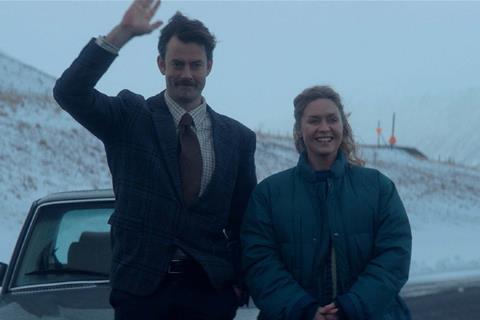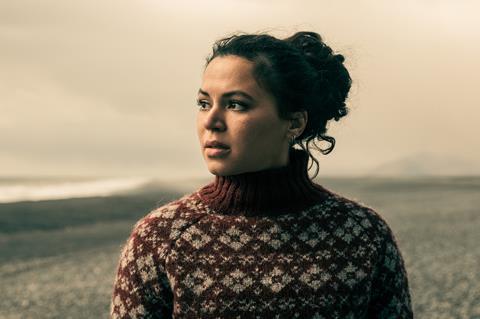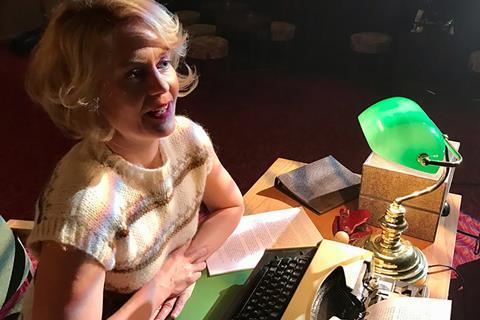
Icelandic fishing quotas do not sound like the stuff of must-see TV, so it is just one sign of the strength of the Icelandic TV boom that the new series Blackport took the international competition grand prize at last year’s Series Mania before winning the Nordisk Film & TV Fond prize in Göteborg in January.
The fishing quotas imposed in the 1980s are just a backdrop to the power struggles and family dramas unfolding in Blackport, which is written by Gisli Orn Gardarsson and Bjorn Hlynur Haraldsson (who also direct and act in the show) alongside Mikael Torfason. Produced by Vesturport, the show is backed by Icelandic public broadcaster RUV alongside Arte France. Andrew Eaton of Turbine Studios served as UK co-producer, with France’s About Premium Content handling sales.
RUV’s head of TV Skarphedinn Gudmundsson sees Blackport as a family saga “like an Icelandic sibling to Dallas”. Fishing quotas provided “the broader spectrum of our series”, actor/writer/director Gardarsson tells Screen International. “The core is the individuals who are at the heart of Iceland in 1983 when the idea of our quota system was born,” he says. “The show has high energy, it’s ruthless, naked and raw — just as the times in Iceland were in the ’80s.”

Set at the other end of the country, near south Iceland’s coastal town of Vik, is Black Sands, which was showcased at the most recent edition of Berlinale Series. Its creator Baldvin Zophoniasson — better known as Baldvin Z — had previously worked on 2015 TV series Case (which sold to HBO Europe, Netflix for the US and Channel 4 for the UK) and is known in the film world for features Life In A Fishbowl (2014) and Let Me Fall (2018), which were both selected for Toronto. While making Case, he met Icelandic police investigator Ragnar Jonsson as an adviser and together they developed the concept for Black Sands, about a thirtysomething detective who returns to her childhood hometown to investigate a tourist’s death and has to come to terms with her dark family history.
Glassriver, which Baldvin Z founded in 2016 with partners including CEO Hordur Runarsson, produces the series, with the private Channel 2 backing alongside YLE, Belgium’s VRT and the Icelandic Film Fund. All3Media handles sales.
The filmmaker says that a company like Glassriver is “changing the atmosphere in Iceland because we only do original content, not working as service providers… we are picking up new directors and creators and doing new shows with them, and we’re getting a stronger belief in ourselves and in our international potential.”
Runarsson adds that he is pleased Glassriver is working across a range of genres, including buddy comedy Journey and supernatural medical drama Fractures. “We’re seeing such different types of shows being made in Iceland now,” he says.
Trailblazer Trapped
Iceland has a powerful storytelling tradition that dates back to 13th-century sagas, and this current wave is being driven by a group of writers, directors and actors who are happy to jump between TV and feature films, creating work that is garnering global attention. Added to that is stable government support through a robust tax incentive, the Icelandic Film Fund and public broadcaster RUV, and crews trained to the highest level courtesy of their work on the many large Hollywood projects that shoot in Iceland every year.
New to the mix, though, is an enhanced international ambition. Some earlier Icelandic shows such as 2007 drama series The Night Shift, which was produced for Channel 2, trickled out to a few territories, but the first series that had truly global ambitions from the outset was Trapped. In December 2015, RUV set Icelandic audience records when it launched the ambitious mystery thriller, about a murder in a remote fishing village where cruise ship passengers are snowed in. Created by Iceland’s busiest filmmaker Baltasar Kormakur (whose film credits include Everest and upcoming Idris Elba-starrer Beast), the RVK Studios production was a hit in the UK (BBC), France (France 2), Germany (ZDF) and many other territories. In late 2021, Kormakur premiered season three of Trapped on RUV and it will be released on Netflix later this year. Olafur Darri Olafsson again leads the cast as police chief Andri with Kormakur noting, “The third season plays strongly into the whole psyche of Andri, further into his personal problems and his own journey.”
Kormakur agrees Trapped set a new benchmark: “It didn’t feel like a small, local production. I was adamant it should travel internationally.” He is also proud it has provided international opportunities for other Icelandic creatives: Ugla Hauksdottir, director of episodes in season two, is now working on Amazon series The Power, while regular helmer Borkur Sigthorsson went on to work on the BBC’s Baptiste. “Trapped started giving them that chance on the bigger stage,” says Kormakur, who himself launched Netflix series Katla in 2021. “It’s helped people become more ambitious. So much opportunity was created out of this.”
Screenwriter Margret Ornolfsdottir worked on season two of Trapped, which she also saw as a game-changer. “I worked alongside writers from the UK and we had a story editor from France and a German producer, so it very much had this international ambition,” says Ornolfsdottir, a veteran of the music industry (as a member of rock band The Sugarcubes) who started writing for Icelandic TV around 2006. She worked on the six-episode Prisoners, which sold well to streamers internationally, and also for Truenorth and Mystery’s serial-killer story The Valhalla Murders, the first Netflix co-production in Iceland.
As a writer, she calls it a “balancing act”, knowing a show might travel but not trying to write something aimed at a generic international audience. “It can be a trap to think, ‘Will this work for the audience in Belgium?’” she observes. “But you are still always imagining how an audience will receive it.”
Balancing act
For public broadcaster RUV, it is important to balance international ambition with the needs of the local audience. “The local audience is our main priority,” says Gudmundsson. “But because we’re such a small market, we’re dependent on international co-production and distribution. We have to find ways of making this work hand-in-hand, making our local original, innovative stories attractive internationally.
“It’s not just about finding the next crime mystery, it’s looking for original stories too,” he adds. It helps that so many of Iceland’s arthouse filmmakers are curious to explore TV. Woman At War director Benedikt Erlingsson, for example, is developing The Danish Woman, his first TV show with RUV, which is set to star Trine Dyrholm.
Even with all these bright spots and ambitious talents, the Icelandic TV industry still has its unique challenges. “When you’re in a market of 100,000 households [367,000 people], that’s the size of one city in Sweden. So financing is a constant struggle,” says Gudmundsson.
As in other territories, booking crews can be a logistical challenge, especially because so many inward investment shoots keep local crews busy. So far in 2022, those include Elba’s Netflix/BBC Film Luther and Hulu series Washington Black.
Ornolfsdottir also cautions that Iceland’s TV makers have to keep fighting. “We go far on our enthusiasm but it’s still a small business compared to other countries,” she says. “We can’t become lazy just because we’re getting this attention. We still have a long way to go to make this work.”
In the pipeline: Upcoming Icelandic series

As Long As We Live
Glassriver produces this 6x45mins show for Channel 2 to star The Tudors actress Anita Briem, who also writes all episodes. The story centres on a former pop star whose stale marriage is shaken up when a young man comes into her family’s life. Set to shoot from summer 2022.
Contact: Eccho Rights
Fractures
Eva Sigurdardottir — a 2013 Bafta nominee as producer for short Good Night — directs this eight-part drama about a female ER doctor, her psychic mother and teenage daughter. Glassriver produces for RUV in co-production with The Lumière Group (Benelux), with co-financing from DR, YLE, NRK and SVT and support from the Icelandic Film Centre.
Contact: REinvent Studios
Home Is Where The Heart Is
Creator Tinna Hrafnsdottir pitched this series at the Tallinn Black Nights and Göteborg film festivals. Streaming service Siminn is on board for the 6x50mins story that Hrafnsdottir describes as “three siblings who have to take over the family’s successful whale-watching company and also inherit a beautiful summerhouse. Then the true character of the siblings and their relationship with their parents comes up.”
Contact: Polarama
Svartfugl
Margret Ornolfsdottir’s next show will be this adaptation of Gunnar Gunnarsson’s lauded Icelandic novel about a famous crime of passion in the early 1800s in the Westfjords. The project is in development and will be taken out to market later in 2022.
Contact: Neutrinos Productions
Vigdis
A drama exploring the life of Iceland’s first female president Vigdis Finnbogadottir, played by The Valhalla Murders’ Nina Dogg Filippusdottir. Set to shoot later in 2022.
Contact: Vesturport






![The Brightest SunScreen[Courtesy HKIFF]](https://d1nslcd7m2225b.cloudfront.net/Pictures/274x183/3/5/0/1448350_thebrightestsunscreencourtesyhkiff_312678.jpg)


















No comments yet